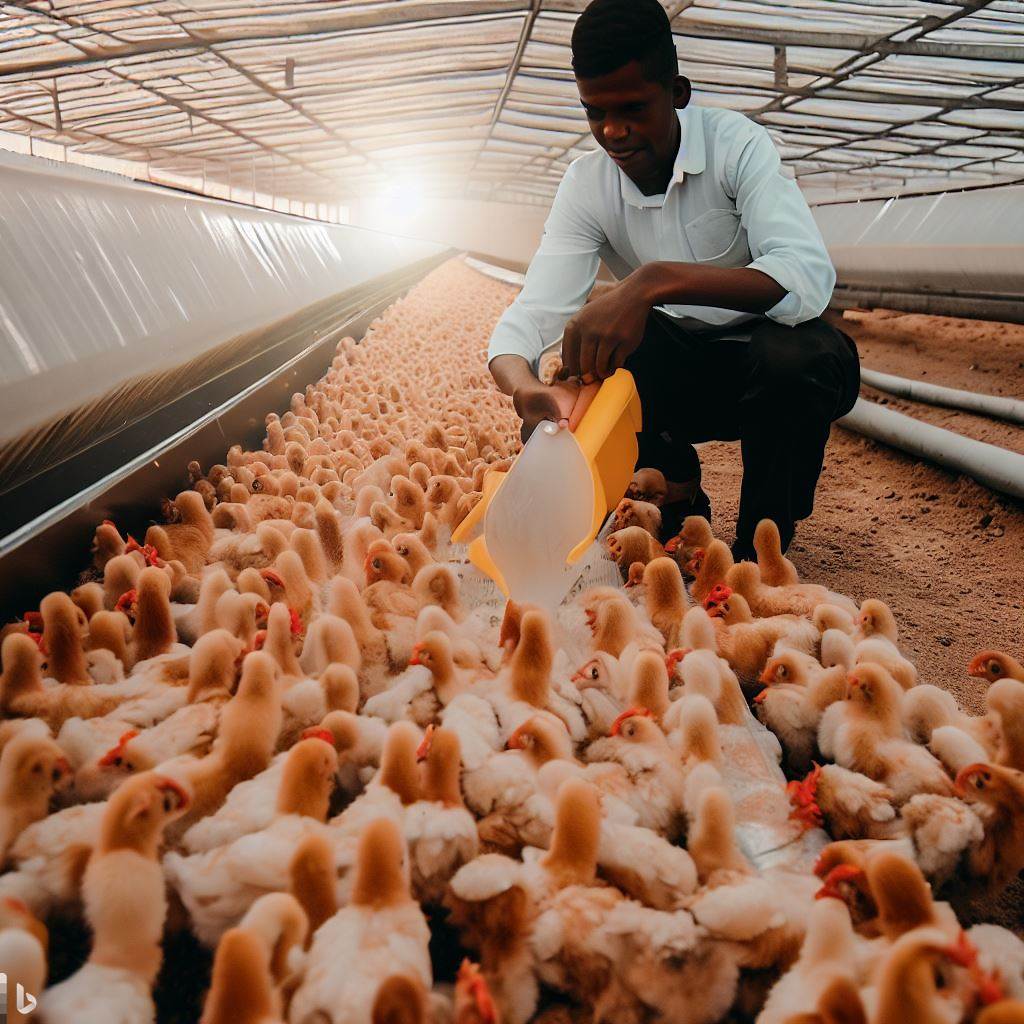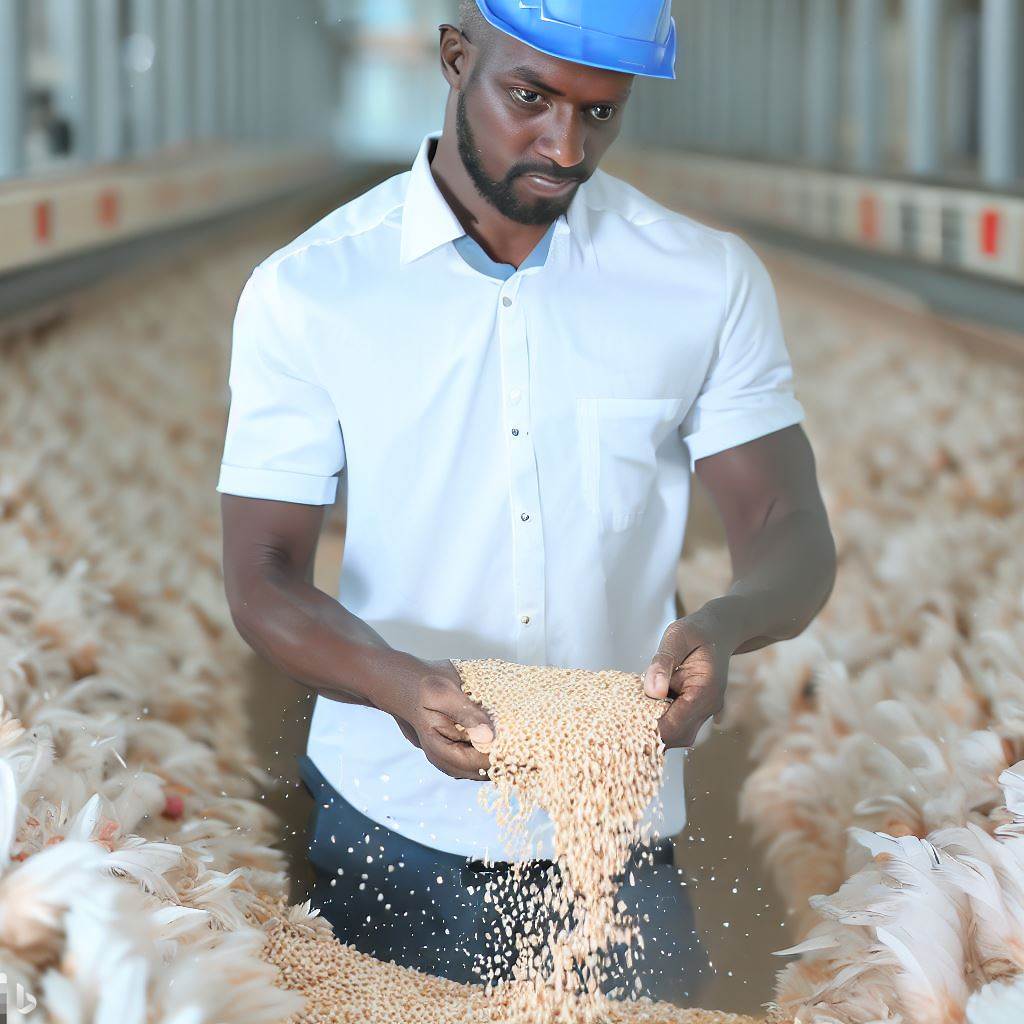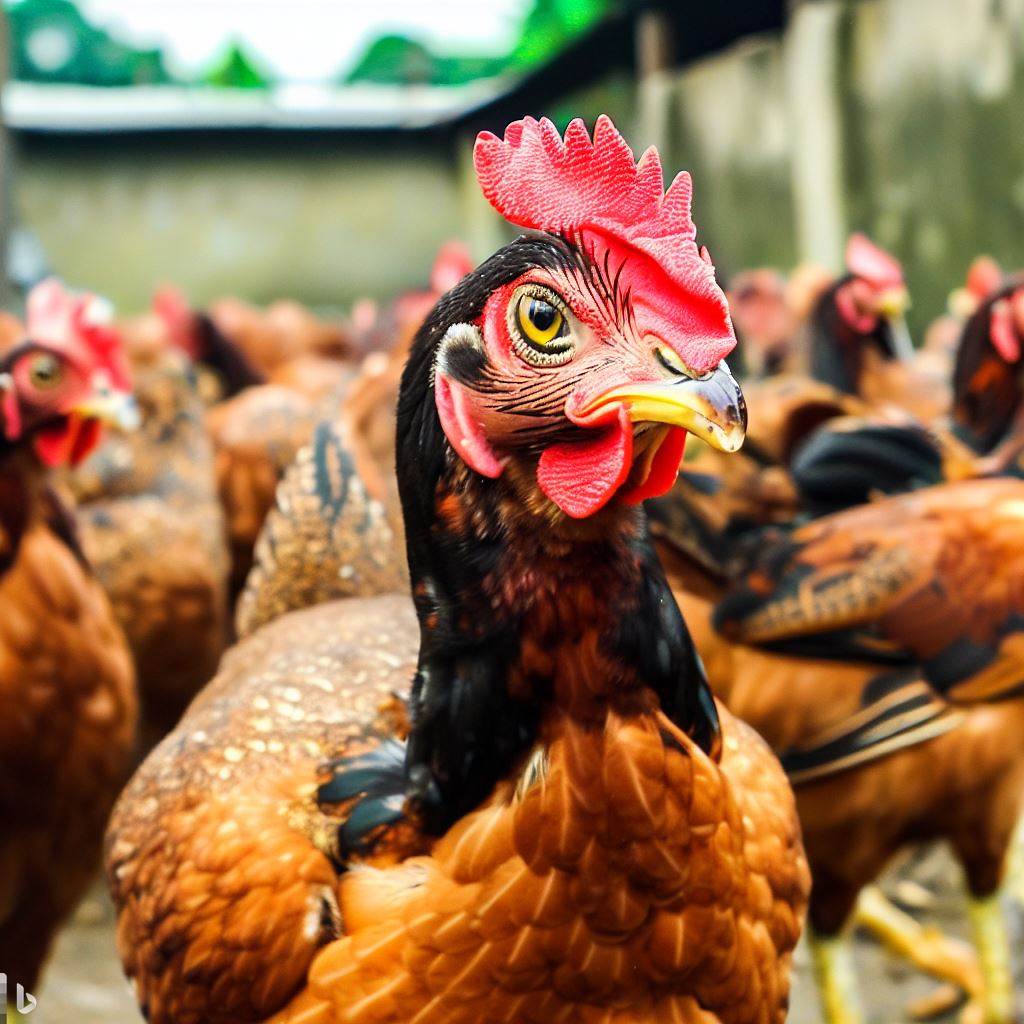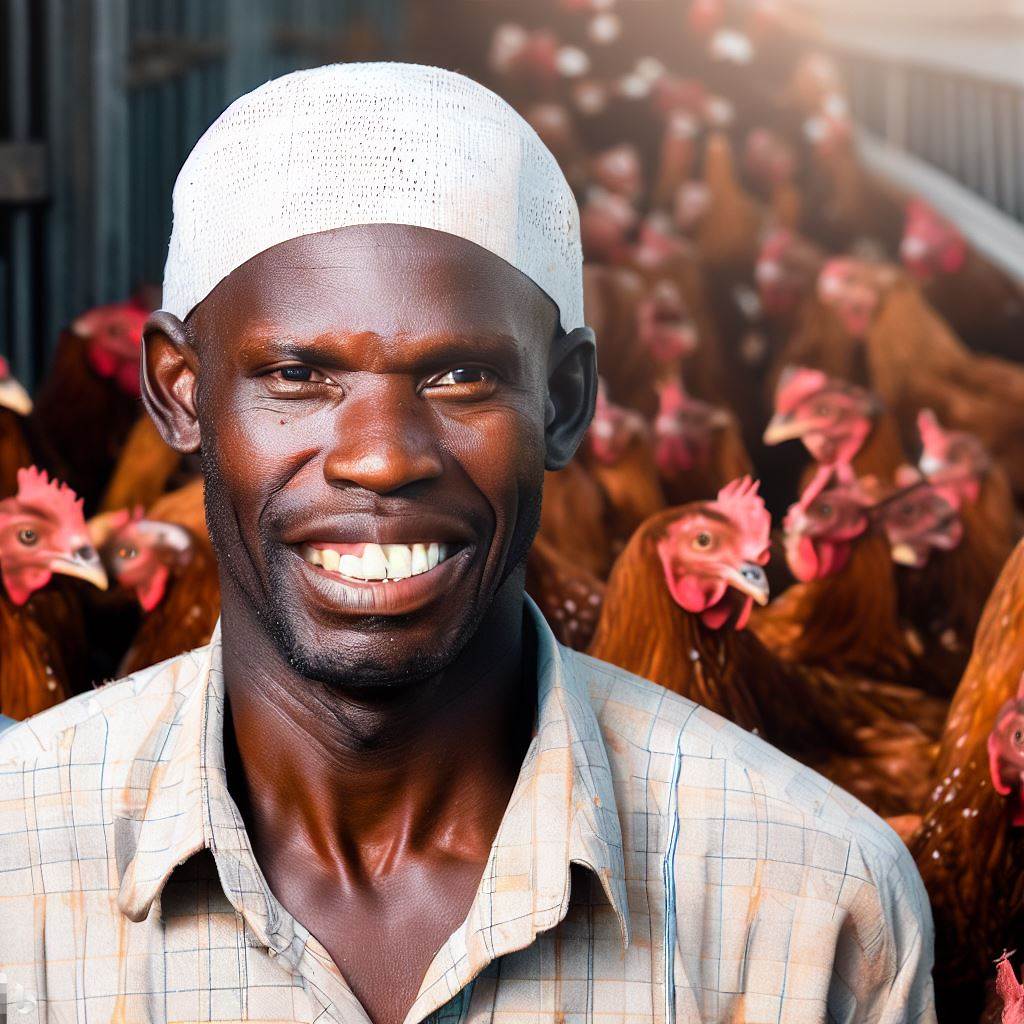Introduction
Poultry production in Nigeria entails the rearing and breeding of domesticated birds such as chickens, turkeys, and ducks.
It serves as a significant sector in the country’s agricultural industry, contributing to economic growth and development.
The importance of poultry production in Nigeria cannot be overstated.
Firstly, it provides a source of income for many small-scale farmers and entrepreneurs, creating employment opportunities and reducing poverty levels.
Additionally, it contributes to food security by supplying nutritious animal protein in the form of meat and eggs to both rural and urban populations.
This blog post aims to shed light on the economics behind poultry production in Nigeria.
It will delve into the costs involved in setting up and maintaining poultry farms, highlighting the profitability and potential risks associated with the business.
The post will also examine the role of government policies and interventions in promoting and supporting poultry production.
Furthermore, the blog will explore the challenges faced by poultry farmers in Nigeria, such as disease outbreaks, feed costs, and market demand fluctuations.
It will discuss strategies and best practices for overcoming these obstacles and improving the profitability of poultry production.
In short, this blog post provides an overview of poultry production in Nigeria, emphasizing its economic significance and role in ensuring food security.
Understanding the economics behind this industry is crucial for farmers, policymakers, and consumers alike.
Stay tuned for the next sections, where we will delve deeper into the various aspects of poultry production in Nigeria.
Overview of the poultry industry in Nigeria
A. Historical background
- Poultry production in Nigeria has a long history, dating back to the colonial era.
- During this time, poultry farming was mainly for subsistence purposes and not commercial.
- It was after Nigeria gained independence that the industry started to see significant growth.
- This growth was mainly due to an increase in demand for poultry products, driven by a growing population and changing consumer preferences.
- The government also played a role in promoting the industry through various policies and initiatives.
B. Current status
- The poultry industry in Nigeria has experienced steady growth in recent years.
- It is now one of the fastest-growing sectors in the country’s agriculture industry.
- Poultry production includes both egg production and meat production, with broilers and layers being the main focus.
- Nigeria has a large and diverse market for poultry products, including both domestic and international demand.
- However, the industry still faces challenges such as disease outbreaks, high production costs, and inadequate infrastructure.
C. Key players and stakeholders
- The poultry industry in Nigeria is made up of various key players and stakeholders.
- These include farmers, both small-scale and large-scale, who are involved in poultry production.
- Feed manufacturers play a crucial role in the industry, as the quality of feed directly affects poultry health and productivity.
- Poultry equipment suppliers provide the necessary equipment and technology for efficient production and management.
- The government and regulatory bodies oversee the industry, setting policies and regulations to ensure food safety and quality.
In fact, the poultry industry in Nigeria has evolved significantly over the years, from subsistence farming to a commercially viable sector.
The industry’s growth has been driven by increasing demand for poultry products, favorable government policies, and support from key players and stakeholders.
However, challenges such as disease outbreaks and high production costs remain significant hurdles for the industry.
Despite these challenges, the future looks promising for the Nigerian poultry industry, with a growing market and potential for further development.
Economic Factors Impacting Poultry Production in Nigeria
A. Market demand for poultry products
- Nigeria has a high demand for poultry products due to its growing population.
- The rising middle class and changing consumer preferences have increased the demand for chicken and eggs.
- Poultry products are a staple in Nigerian cuisine and are consumed on a daily basis.
- The demand for poultry products is also driven by the food processing industry, hotels, and restaurants.
- Poultry meat and eggs are affordable sources of protein for lower-income households.
B. Cost of production inputs
- The cost of production inputs presents a major challenge for poultry farmers in Nigeria.
- Feed constitutes a significant portion of production costs, and the fluctuating prices of feed ingredients affect profitability.
- Poultry farmers also face high costs for vaccines, medications, and farm equipment.
- The cost of electricity and fuel for running poultry farms adds to the overall cost of production.
- Farmers often struggle to access affordable credit to finance their poultry production activities.
C. Government policies and regulations
- The Nigerian government plays a crucial role in regulating and supporting the poultry industry.
- Policies related to importation, tariffs, and subsidies impact the competitiveness of locally produced poultry products.
- Government regulations on biosecurity, food safety, and quality standards aim to protect consumers and promote the industry.
- Inconsistent implementation of policies and corruption can hinder the growth of the poultry sector.
- Collaboration between the government and industry stakeholders is crucial for addressing challenges and fostering growth.
D. Infrastructure and logistics
- Inadequate infrastructure and logistics pose significant challenges for poultry production in Nigeria.
- Limited access to reliable electricity results in increased costs for alternative power sources.
- Poor road networks and transportation systems make it difficult to move poultry products efficiently from farms to markets.
- Inadequate cold storage facilities lead to post-harvest losses and reduced product quality.
- Improvements in infrastructure, such as electricity supply and transportation networks, are necessary to support the growth of the poultry industry.
Most importantly, poultry production in Nigeria is influenced by several economic factors.
The high market demand for poultry products, coupled with the rising middle class and changing consumer preferences, presents opportunities for growth.
However, challenges such as the cost of production inputs, government policies and regulations, and inadequate infrastructure need to be addressed to realize the full potential of the poultry industry in Nigeria.
Read: Understanding the Market Demand for Poultry in Nigeria
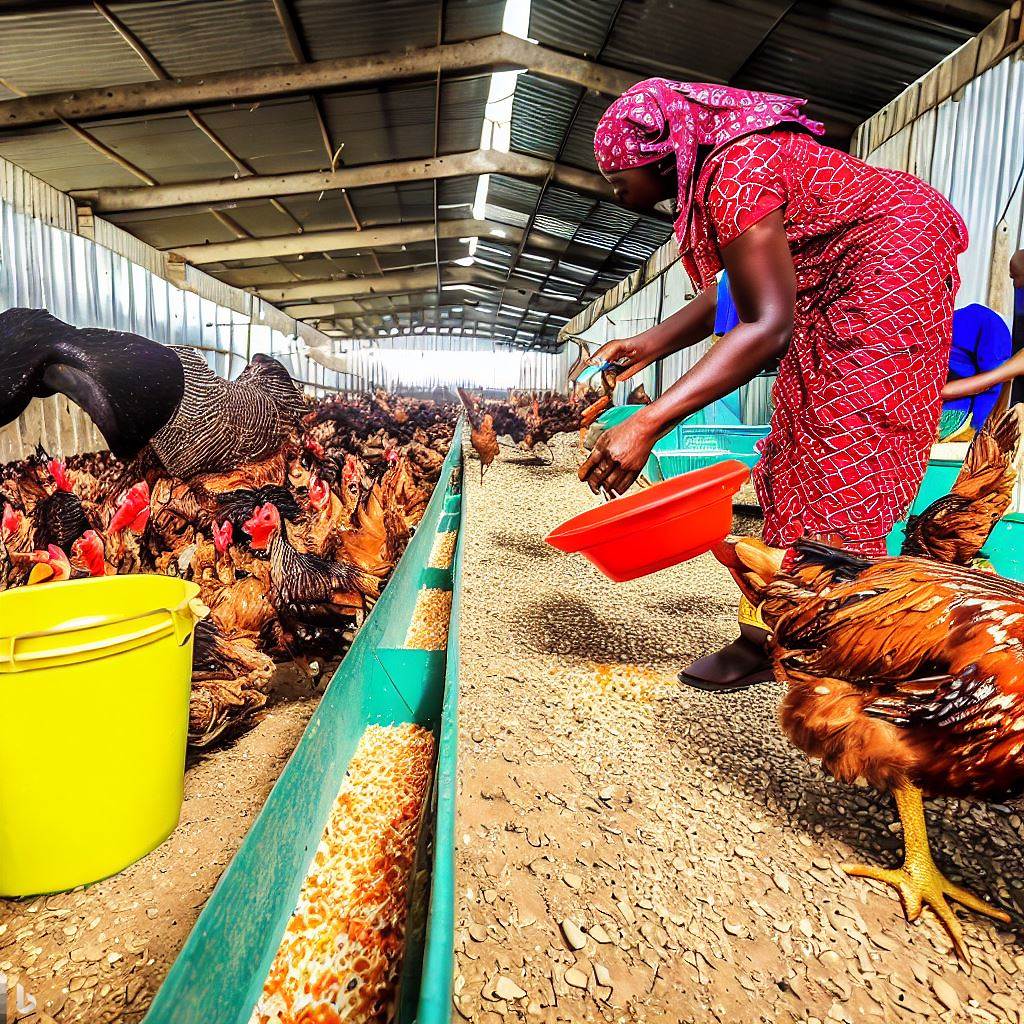
Challenges Faced by Poultry Producers in Nigeria
A. Disease outbreaks and biosecurity measures
Disease outbreaks pose a significant challenge to poultry producers in Nigeria.
Biosecurity measures are crucial to prevent the spread of diseases and protect the poultry population.
Implementing strict biosecurity protocols, such as controlling access, proper disinfection, and vaccination, is essential.
Regular monitoring and early detection of diseases can help mitigate their impact on poultry farms.
Collaboration between private and public sectors is necessary to enhance disease surveillance and response.
B. Feed availability and affordability
Poultry producers in Nigeria face challenges regarding feed availability and affordability.
The high cost of feed ingredients, such as maize and soya bean, contributes to production cost.
Erratic supply chain of feed ingredients results in fluctuations and scarcity.
Investment in local production of feed ingredients and storage facilities can improve availability.
Efforts to develop cost-effective alternative feed sources can help reduce dependence on imports.
C. Lack of access to finance and credit facilities
Limited access to finance and credit facilities is a major challenge for poultry producers in Nigeria.
High interest rates, stringent collateral requirements, and limited financial literacy hinder access to funds.
Government and financial institutions should provide targeted support for the poultry industry, including low-interest loans.
Training programs and financial literacy initiatives aimed at poultry producers can enhance their capacity to access financing.
D. Inefficient production methods and technology adoption
Poultry producers in Nigeria often face inefficiencies in their production methods and inadequate technology adoption.
Outdated farming practices hamper productivity and profitability.
Lack of awareness and training on modern production techniques hinder technology adoption.
Investing in research and extension services can promote the dissemination of best practices.
Government support through incentives and subsidies can encourage the adoption of efficient production methods and technology.
In general, Nigerian poultry producers encounter various challenges that hinder their economic success and growth.
Addressing these challenges requires collaborative efforts from both the private and public sectors.
By implementing strict biosecurity measures, ensuring feed availability and affordability, improving access to finance and credit facilities, and promoting efficient production methods and technology adoption, the poultry industry in Nigeria can overcome these challenges and thrive.
Read: Health and Safety Standards in Nigeria’s Poultry Industry
Economic Opportunities and Potential Solutions
As the poultry industry in Nigeria continues to evolve, there are several economic opportunities and potential solutions that can further enhance its growth and sustainability.
A. Export potential and international market opportunities
Nigeria has a significant potential for exporting poultry products to international markets.
With its large population and growing demand for poultry, the country can leverage this demand to expand its exports.
However, to tap into these opportunities, Nigeria must meet international quality and safety standards.
Investing in improving the quality of poultry products, implementing strict food safety standards, and obtaining internationally recognized certifications can help Nigerian poultry producers gain access to lucrative export markets.
B. Value-added products and diversification
Another way to boost the economic potential of poultry production in Nigeria is by focusing on the development of value-added products and diversification.
Instead of solely producing and exporting raw poultry products, the industry can expand into processed and refined products.
By investing in processing facilities, poultry producers can create value-added products such as canned chicken, frozen chicken cuts, and ready-to-cook chicken meals.
The diversification of products will not only increase revenue but also create more employment opportunities and reduce post-harvest losses.
C. Government support and incentives
Government support and incentives play a crucial role in promoting the growth and development of the poultry industry.
The government can offer tax incentives, subsidies, and grants to poultry farmers and producers to encourage expansion and investment in modern production techniques.
Additionally, the government can provide infrastructure support, such as improving road networks for efficient transportation of poultry products, and invest in research and development to enhance the productivity and sustainability of the industry.
D. Technological advancements for improved efficiency
Embracing technological advancements is vital for improving the efficiency and competitiveness of poultry production in Nigeria.
The adoption of modern farming techniques, automation, and precision agriculture can significantly increase productivity and reduce production costs.
Technologies such as remote monitoring systems, data analytics, and biosecurity measures can help poultry farmers optimize their production processes, monitor health conditions of the birds, and prevent disease outbreaks.
These advancements can also improve the overall welfare of the birds and ensure better quality products.
In a nutshell, the poultry industry in Nigeria has vast economic potential.
By exploring export markets, developing value-added products, receiving government support, and embracing technological advancements, the industry can thrive and contribute significantly to the country’s economy.
Read: Impact of Government Policies on Poultry Production in Nigeria
Case study: Successful Poultry Production Ventures in Nigeria
Highlighting examples of profitable poultry businesses:
- Ade Farms has achieved great success in poultry production by focusing on organic and free-range practices.
- Nkem Poultry Farm has implemented efficient biosecurity measures, resulting in high-quality and disease-free poultry products.
- Obi Poultry Ventures has a successful market strategy, targeting urban areas with a high demand for poultry products.
- Ola Farms has invested in modern technology and automation, resulting in increased productivity and reduced costs.
- Grace Poultry Farm has established a strong brand reputation for its premium quality and nutritious poultry products.
Discussing their strategies and best practices:
- Ade Farms’ strategy includes organic practices, sustainable feed sourcing, and marketing towards health-conscious consumers.
- Nkem Poultry Farm ensures biosecurity by strict hygiene protocols, vaccination programs, and regular farm inspections.
- Obi Poultry Ventures has a robust distribution network, partnerships with supermarkets, and targeted advertising campaigns.
- Ola Farms employs automated feeding systems, climate control technology, and data analytics for efficient management.
- Grace Poultry Farm focuses on product quality, nutrition, and customer satisfaction through strict quality control measures.
Lessons that can be learned from their success
- Adopting organic and sustainable practices can be a differentiating factor and attract health-conscious consumers.
- Implementing strict biosecurity measures ensures the production of disease-free poultry products.
- Targeting specific market segments and establishing strong distribution networks can lead to higher profitability.
- Investing in modern technology and automation can improve productivity and reduce production costs.
- Emphasizing product quality and customer satisfaction can build a loyal customer base and increase market share.
Read: Emerging Trends in the Nigerian Poultry Production Sector
Gain More Insights: Promoting Animal Health: Veterinary Practices in Nigeria
Conclusion
We have delved into the key facets of the economics governing poultry production in Nigeria.
Undoubtedly, it’s imperative to underscore the vast prospects that this sector holds within the nation.
The economic viability of poultry production is indisputable, given the growing demand for poultry products coupled with the potential for employment generation.
To further bolster this industry, continued research and a dedicated push for innovation are strongly advocated.
This approach will not only enhance productivity but also streamline processes for maximum economic yield.
In essence, by recognizing the economics of poultry production in Nigeria and fostering advancements, we can undoubtedly unlock new avenues for economic growth and sustainability.

